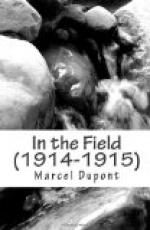“Take this to the Colonel, and quickly. I will wait here for the brigade.”
I then rode slowly to the corner of the wood, where Madelaine and Lemaitre were posted, whilst Wattrelot went off at a trot across the stubble. But a sad sight was awaiting me.
Lemaitre was standing in great grief over poor “Ramier,” lying inert on the ground and struggling feebly with death. His eyes were already dull and his legs convulsed. Every now and then he shuddered violently.
I looked at Lemaitre, who felt as if he were losing his best friend. And, indeed, is not our horse our best friend when we are campaigning—the friend that serves us well to the very last, that saves us time and again from death, and carries us until he can carry us no longer? I dismounted and threw the reins to Lemaitre:
“Don’t grieve, my good fellow; it is a fine end for your ‘Ramier.’ He might, like so many others, have died worn out with work or suffering under some hedgerow. He has a soldier’s death. All we can do is to cut short his sufferings and send him quickly to rejoin his many good comrades in the paradise of noble animals. For they have their paradise, I am sure.”
But Lemaitre hardly seemed convinced. He shook his head sadly, and said:
“Oh, mon Lieutenant! I shall never be able to replace him. Such a good animal! such a fine creature! He jumped so well.... And his coat was always so beautiful; he was so sleek and so easy to keep.... No, I shall never find another like him.”
“Oh! yes, you will.”
However, I must confess my hand trembled as I drew my revolver. One horse the less in a troop is somewhat the same as one child the less in a family. And, besides, it means one trooper unmounted and the loss of a sword in battle. Lemaitre was right. “Ramier” was a good old servant, one of the kind that never goes lame, can feed on anything or on nothing, and never hurts anybody. It was hard to put an end to him; but since he was done for....
I put the muzzle of my revolver into his ear. I did not wish him to feel the cold metal; but his whole body shuddered, and his eye, lighting up for a moment, seemed to reproach me. Paff! A short, sharp report, and “Ramier” quivered for a moment. Then his sufferings ceased, and his stiffening carcase added one more to the many that strewed the country.
Whilst Lemaitre slung his heavy package on his shoulders and went off to return to the regiment with Corporal Madelaine, who was leading “Attraction,” I went back to my observation post, not far from Finet and Vercherin. Silence and gloom still hung over Courgivault.
Suddenly, behind me, coming out of the wood, I saw a cavalry troop in extended order, riding in our direction. They were Chasseurs d’Afrique. I recognised them by the large numbers of white horses, which made light patches upon the dark green of the thicket, and almost at the same moment a dull report resounded in the distance. A curious humming noise was heard above our heads, and a shell fell and burst at the foot of the stacks in the possession of the Prussian infantry. It came from one of our batteries of 75-millimetre guns, which was already getting the range of Courgivault.




